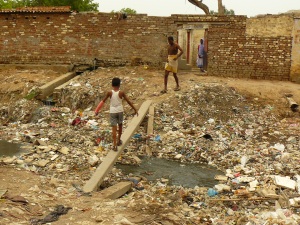Here at Mazdoor Ekta Mach, we organised a public event and seminar on 2nd March 2012 to accelerate the wage theft campaign. This event took place in Zila Parishad Hall (John Hall), near Rajiv Chowk, Gurgaon. A number of trade union leaders, labour lawyers, local people, workers and officials of government department participated in this event and shared their views about wage theft and poor conditions of workers.
The event began with a welcome address from Ms. Anannya Bhattacharjee, President of Garment and Allied Workers Union. She welcomed all the participants and guests and introduced about the objectives of campaign. She also encouraged workers as well as present guests from civil society to stand against any kind of exploitation of workers and wage theft. Moti Singh, Treasurer of Rajput Mahasabha, warmly welcomed the idea to stop wage theft and promised that he will always stand in support of workers’ rights and the hall of Rajput Mahasabha will always be open and welcome any event on workers’ rights issues.
Later the event was addressed by Comrade Yogesh, a worker of the automobile industry and a member of Inqualabi Mazdoor Kendra. He shared his views and encouraged workers to protest against any kind of wage theft. He emphasized the need to extend the campaign on wage theft to other areas of Haryana as well. Deepak, a worker from the automobile industry and member of Inqualabi Mazdoor Kendra, said that we should follow Marxist ideology to start any workers’ struggle. He showed a great concern for the issue of wage theft and support for the campaign.
The event was chaired by prominent social activist and leader Swami Agnivesh. He marked his deep concern with workers’ problems of wage theft and shared his long experience, highlighting positive examples of his case, battle and campaign against bonded labour. He addressed and encouraged workers to join this campaign for a successful outcome. He wished for a successful campaign ahead through the leadership of Mazdoor Ekta Manch.
An eminent labour lawyer and leader of CPI (M), Rajendra Pathak, shared that when people stand up for workers’ rights then they may be trapped by industrialists. When he raised his voice against exploitation of workers he was framed through being falsely charged for criminal cases. He has been framed in eight criminal cases including a murder case. We should be careful to lead movements but never hold back from it. We will start campaigns in a more organised way. This campaign could be a more powerful weapon to organise workers and convince them to struggle. Anil, a famous labour leader of Gurgaon and head of local unit of All India Trade Union Congress, congratulated Mazdoor Ekta Manch for the campaign on a basic and common problem of workers and promised to support the campaign.
Dr. Rakesh Chamar, a doctor from the ESI department said that we always motivate campaigns for the well-being of workers. We will make workers in ESI department aware about the campaign.
A very good and sensitive play was performed by the children of Tarang Kala Kendra which was based on wage theft. The play was directed by Ms. Nayika Nagpal. It received huge applause and praise. Labour leaders and lawyers have their blessings to this issue based play and entertainment. They also gave a prize to the children. Media persons also came to cover the event and reported about it.
We were very encouraged by the success of this event and hope to hold further awareness raising events in the future.



